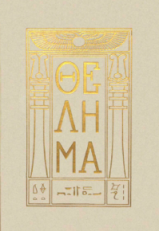
Do what thou wilt shall be the whole of the Law.
One of the ever-present questions in the discourse about Thelema is whether or not it is a religion. I think this question is most poetically answered by someone – I believe the credit goes to Jake Stratton-Kent – who said:
“There is religion in Thelema for those that require it. There is also freedom from religion in Thelema, for those that require it.”
In short: Yes… and no. All I can attempt to do is elaborate on this position to make it a bit more clear.
Before going too far in depth, it should be said that – according to anthropologists, sociologists, theologists, and the like – Thelema would most definitely be classified as a “religion.” It has a “Bible” (Liber AL vel Legis), a moral code (Do what thou wilt), a Prophet (To Mega Therion), a set of practices (Magick), and even a “pantheon” (Nuit, Hadit, Ra-Hoor-Khuit, Hoor-paar-kraat, et cetera). Whether or not this is entirely an accurate designation is another question.
We might first look at why people wouldn’t want to call Thelema a “religion.” The answer is fairly obvious: “religion” in the 21st Century has become synonymous with superstition, tyranny, and oppression. There is no doubt about this: organized religion has, for millenia, been a force for all of these horrible things that stand against the spirit of Liberty. Many people who are most vocal about Thelema not being a religion are those who experienced this superstition, tyranny, and oppression first-hand in their childhood, and I personally do not find their reaction to be hard to understand.
In this light, we can see that Crowley himself was wary of the use of the term “religion” to describe Thelema. In a letter found in Magick Without Tears, he writes:
“To sum up, our system is a religion just so far as a religion means an enthusiastic putting-together of a series of doctrines, no one of which must in any way clash with Science or Magick. Call it a new religion, then, if it so please your Gracious Majesty; but I confess that I fail to see what you will have gained by so doing, and I feel bound to add that you might easily cause a great deal of misunderstanding, and work a rather stupid kind of mischief.“
We should note, firstly, that Crowley begins this quotation by saying that – according to a certain definition of religion as “an enthusiastic putting-together of a series of doctrines” – Thelema is, in fact, a religion. He then says that calling Thelema a “religion” may cause misunderstanding and mischief. He does not explain exactly why it would cause misunderstanding and mischief but we can guess that it is most likely for the aforementioned reasons: it associates it with the Old Aeon religions that are gleaming beacons of superstition, tyranny, and oppression, i.e. those exact things we are set to destroy with our Law of Liberty. People may also assume that we believe things that other religions do, especially the Judeo-Christian-Islamic type, such as the belief in a gaseous vertebrate breed of God, which is most certainly false.
In short, we may refrain from calling Thelema a religion because it associates it with superstition, tyranny, and oppression which Thelema is firmly against in every way, being the Law of Liberty. Our Law is simultaneously more simple and more nuanced than a belief in a Judeo-Christian-Islamic Daddy-in-the-sky God. Keep in mind, though, that this implies that calling Thelema a religion may cause misunderstanding and mischief, but it does not imply that the designation is inaccurate in some fundamental way.
Now we may turn to the reasons why Thelema is a religion. First of all, Crowley calls Thelema a religion repeatedly.
In his commentary on Liber AL, III:22, Crowley writes:
“Our religion therefore, for the People, is the Cult of the Sun, who is our particular star of the Body of Nuit, from whom, in the strictest scientific sense, come this earth, a chilled spark of Him, and all our Light and Life.”
In this line, he very clearly calls Thelema a religion, although there is a caveat that it is “for the People,” by which we may assume he means “the masses” and not necessarily for the “Hermits” or “initiates” or “Adepts” (although this is, admittedly, an assumption).
In The Constitution of the Order of Thelemites, Crowley writes this Order is against “All superstitious religion, as obstacles to the establishment of scientific religion.” Here he clearly calls Thelema a religion, but he opposes “superstitious religion” (those of the Old Aeon and many of those that have cropped up in the New Aeon as well) to “scientific religion.” We get a further clarification that Thelema, insofar as it is a religion, is not opposed to science.
In the “Editorial” prefacing The Equinox III:1 (also known as The Blue Equinox), Crowley writes an important passage:
“The world needs religion. Religion must represent Truth, and celebrate it. This truth is of two orders: one, concerning Nature external to Man; two, concerning Nature internal to Man.
Existing religions, especially Christianity, are based on primitive ignorance of the facts, particularly of external Nature. Celebrations must conform to the custom and nature of the people. Christianity has destroyed the joyful celebrations, characterized by music, dancing, feasting, and making love; and has kept only the melancholy.
The Law of Thelema offers a religion which fulfils all necessary conditions. The philosophy and metaphysics of Thelema are sound, and offer a solution of the deepest problems of humanity. The science of Thelema is orthodox; it has no false theories of Nature, no false fables of the origin of things. The psychology and ethics of Thelema are perfect. It has destroyed the damnable delusion of Original Sin, making every one unique, independent, supreme, and sufficient. The Law of Thelema is given in the Book of the Law.”
Here we have another instance of Crowley explicitly calling Thelema a religion. He insists again that it must “represent Truth, and celebrate it,” concurring with the aforementioned quotation that insists Thelema is a “scientific religion.”
From these quotations, it seems fairly clear that Crowley did – with the caveat that it represents and celebrates Truth and is “scientific” – consider Thelema a religion. There is a further point that, in my opinion, clarifies the entire matter: Thelema is a religion but it is more than just a religion. I have said several times that Thelema is an all-encompassing paradigm, and this is meant to imply that Thelema is a religion… and much more.
We have already seen inklings of this idea in the previous quotation where Crowley calls Thelema a religion while also mentioning the philosophy, metaphysics, science, psychology, and ethics of Thelema. In his Confessions, Crowley conveys this idea that Thelema is more than just a religion with great clarity when he writes:
“Thelema implies not merely a new religion, but a new cosmology, a new philosophy, a new ethics. It co-ordinates the disconnected discoveries of science, from physics to psychology, into a coherent and consistent system. Its scope is so vast that it is impossible even to hint at the universality of its application.”
He says “Thelema implies not merely a new religion.” It also implies a new cosmology, philosophy, and ethics. Thelema is not limited to the small sphere of theology. This perspective is reflected in the fact that we, following Crowley, call Thelema a “Law.” This Law is given in The Book of the Law. Crowley also calls Thelema a “formula.” For example, in the essay “The Beginning of the New World” (which can be found in the recently-published The Revival of Magick), Crowley writes:
“The many religions of the world have all lost their power to guide chiefly because the development of means of transport and of international commerce have convinced the educated that any one religion is about as good or bad as another for the purposes of social discipline, and that none has any validity from the standpoint of actual fact, or historical or philosophical truth.
The remedy is evidently to be found only in one way. There must be found a formula based upon absolute common sense, without one trammel of theological theory or dogma, a formula to which no man of intelligence can refuse assent, and which at the same time affords an absolute sanction for all laws of conduct, social and political no less than individual, so that the right or wrong of any isolated or concerted action can be determined with mathematical accuracy by any trained observer, entirely irrespective of his personal idiosyncrasies. This formula is: Do what thou wilt shall be the whole of the Law.”
When we consider Thelema as a “Law” or a “formula,” we are – first of all – using language that is in common with science (e.g. “the law of gravity” or “the formula for calculating velocity”). More importantly, we are using language that is universal insofar as this Law or formula applies to all aspects of life.
 I believe the idea that Thelema is not just a religion but a new paradigm of cosmology, metaphysics, ethics, and psychology is the most accurate perspective on whether or not Thelema is a religion. Insofar as Thelema is a religion, it is a religion that is explicitly opposed to superstition, to “theological theory or dogma” (ideally!), and oppression. In the end, what’s in a name? Thelema’s Law is “Do what thou wilt” and people are free to call it a religion or not. Whether you choose to call it a religion or not is your own choice, and whether or not someone else chooses to call Thelema a religion is none of our business. The real question, the one that really matters, is: Are you living the Law of Thelema? Have you written “Do what thou wilt” in your heart and in your brain? Have you used the simplicity of the Key of the Law to unlock the complexities of philosophy, psychology, theology, and daily life? In short: are you doing your True Will or not? In light of this central consideration all other things, including what names and titles we give to things, are – at best – totally irrelevant and are – at worst – leading us to mischief and futility. As always: There is no law beyond Do what thou wilt.
I believe the idea that Thelema is not just a religion but a new paradigm of cosmology, metaphysics, ethics, and psychology is the most accurate perspective on whether or not Thelema is a religion. Insofar as Thelema is a religion, it is a religion that is explicitly opposed to superstition, to “theological theory or dogma” (ideally!), and oppression. In the end, what’s in a name? Thelema’s Law is “Do what thou wilt” and people are free to call it a religion or not. Whether you choose to call it a religion or not is your own choice, and whether or not someone else chooses to call Thelema a religion is none of our business. The real question, the one that really matters, is: Are you living the Law of Thelema? Have you written “Do what thou wilt” in your heart and in your brain? Have you used the simplicity of the Key of the Law to unlock the complexities of philosophy, psychology, theology, and daily life? In short: are you doing your True Will or not? In light of this central consideration all other things, including what names and titles we give to things, are – at best – totally irrelevant and are – at worst – leading us to mischief and futility. As always: There is no law beyond Do what thou wilt.
Love is the law, love under will.

If you enjoy these writings, please consider pledging $1+ on my Patreon
As always, Very good work.
LikeLike
Thelma, is a dialectical precept, and an idea… It is nothing which binds, and that thing which sets free; and it is that only.
LikeLike
PERFECT, wileyoddysseus I follow his reasoning..
LikeLike
When I joined OTO years ago, I did not dwell too much on the religion or not question.Of course you are surrounded be religious type symbols.Crowley used everything heighten this sense.I remember people that called themselves Thelemites, bring a lot of religious baggage to the table of the magician.I was a gnostic priest for a couple years, but even though I submerged myself in the ritual, I did not have much of a chance to think about the religion aspect.I was just dealing with the usual politics of the order.I read the Book of the Law religiously but not as a “religion”. Some people think they are getting “powers” and it goes to their heads.Oh, religion what powers do you hide behind, or what powers hide behind you? 93 or if 6 was 9
LikeLike
Great write-up. I’m not a thelemite, but I know many an atheist who had no trouble coming to grasp with it. I prefer philosophy over religion. Results over belief.
LikeLike
“All other things, including what names and titles we give to things, are – at best – totally irrelevant and are – at worst – leading us to mischief and futility”
I must say: that ^this^_thought — argues with my Respect for the power of Language: as a tool for advancement and study- Intellexitque sermonem intellegentia: est enim sapientia: γι την σοφί τη νοημοσύνη: λόγι: έμαθα.
Although, theoretically, the statement is true.
LikeLike
93 – It is, admittedly, a polemical point intended to emphasize certain ideas, not make statements of absolute validity. There are obviously cases where this doesn’t hold but to look at those is to miss the intent of the sentence. Power of language.
LikeLike
Wonderful! Very much enjoyed the information.
LikeLike
Perhaps what might really be pertinent to inquire what Crowley really means when he uses the word “religion”. Are we to understand this in the same context as Christianity, Judaism, Islam, Mormon, Scientology, and the like? If so, then is it just yet another one to add to this ever growing pile? Crowley was always careful to conceal his meanings in word-play and here there might be a clue into what he really means. If we turn to the Bible (a book which Crowley himself knew extreemly well) to Mark Ch V verse 8-9 we read the following:
8. “For he said unto him, Come out of the man, thou unclean spirit.
9 And he asked him, What is thy name? And he answered, saying, My name is Legion: for we are many.”
And so too, are we many…..
Agent 719
LikeLike
Every religion in they center have some kind mode of sacrifice and on opposite side there is a faith in that sacrifice that will pleased the gods or some kind supernatural power. In Thelema we have a Nuit who say:
“I give unimaginable joys on earth: certainty, not faith, while in life, upon death; peace unutterable, rest, ecstasy; nor do I demand aught in sacrifice.” There is no some external god, or worshipful object to adore or idolizing…if we adore Hadit or Nuit or RaHoorKhiut we adore them as a aspects of cosmic drama of Nothingness confirming a word of Prophet …”There is no god but man”…whole AL (and Thelema in global) have indications about two opposite force who trying to make equilibrium (L) – zero point of two extreme opposites. “I am alone (ALL ONE) : there is no God where I am.”…for me Thelema is not so much a religion, it is much more a bursting fire and force of liberation…
LikeLike